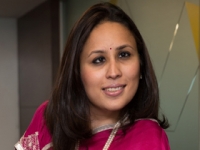“Teach your daughters to worry less about fitting into glass slippers and more about shattering glass ceilings.”
Inevitably every year, India celebrates the break out achievements of some exceptional women, whether it is Hima Das or PV Sindhu a few years ago, or more recently Gita Gopinath, the first Indian women serving as Chief Economist of the IMF. Is this the complete story? A few weeks ago, some women alumnae of my school Wharton, met at a dinner – one the CEO of a manufacturing business, one the CEO of a film production business, and myself from the asset management business. All three of us, across three different domains, had the same complain – there are hardly any women leading businesses. Even today, labour force participation for women in India is 28%, compared to 82% for men in 2017, some of the lowest in the world, and women CEOs and board members are a tiny percentage. This continues to be our reality, one that we are reminded of on International Women’s Day, in March, but honestly one, that we should talk about on more than just one day of the year.
One of the important signs of any developing country is how financially independent it’s women are. I distinctly remember, that in my own family, my grandmother was the first working woman – a school teacher who started working, not knowing that she would one day become the breadwinner of the family. If there was one thing she encouraged her daughters, daughter in laws, and grand-daughters to do, it was to become financially independent, to stand on their own two feet. Her argument was simple – financial independence gives you freedom, the freedom to make decisions and the freedom to pursue your dreams. Financial independence is also not just about working hard to make money, but also making money work harder than you. While many women still hesitate to take charge of their finances, investing is a basic life skill, and a simple one at that. And if women are smart enough to build a career and earn money, they are certainly wise enough to invest it!
Many of us do believe – and celebrations around Women’s Day often encourage this – that the financial independence of women is one, a women’s issue, and two, just a good social issue. I disagree. Gender diversity is a deep economic issue, and it is everyone’s issue. It is a documented fact that countries with higher amounts of participation in the workforce of women, are stronger and more robust economies. Economic growth depends on the growth and skills of the labour force, the movement of people from low to high productivity activities, and the investment in education and skills of future generations, all of which is facilitated when our women join the workforce. McKinsey reports that if in India, the labour force participation of women, went up by 10%, we would add $700 billion to our GDP by 2025. For a developing country, that is a big number – 1.4% to GDP to be precise. In a study on women’s participation in corporate boards, IMF found that adding just one women to a board incrementally, without further changes to gender diversity may add 8-13 bps to the bottomline of companies. And there are tremendous examples of societies that have embraced this globally – Israel, Norway and much of the Scandinavian block – and are counted among some of the most progressive and prosperous countries in the world.
When my grandmother embraced financial independence, she ensured that two generations of women, and hopefully many more after her, did so, and this is true at large. When a women becomes financially independent, the impact on society is far reaching and not just immediate. Financial independence gives women decision making power, and remember, women influence a large part of the buying decisions (80% in the US) not just for themselves, but for their families. In the US, women also influence 70% of financial decisions – because they decide not just for themselves, but potentially for their children, and elderly parents as well. An increased share in household income controlled by women will lead to more spending on children’s education and health, all essential to a prosperous economy. In fact, a society that doesn’t invest in leveraging the potential of its women, is a little bit like a two engine aircraft, that has chosen to fly with one engine.
So to all those reading this, men or women, Women’s Day, and empowering women financially is not about a single day, it is not about a few panels and television shows, and it not just a women’s issue. If you are a man, partner with the ladies in your life – in their careers, and at home, where they can make financial decisions, regardless of whether they are working. Give your daughters the courage to dream, and the wings to fly when they have to. And if you are a woman, work hard, dream big, and make it happen. To change the lines of a popular movie, ladies, Apna Time Aa Gaya.
Wishing all of you a very happy International Women’s Day!
Radhika Gupta is the Chief Executive Officer of Edelweiss Mutual Funds and the views expressed above are her own.





